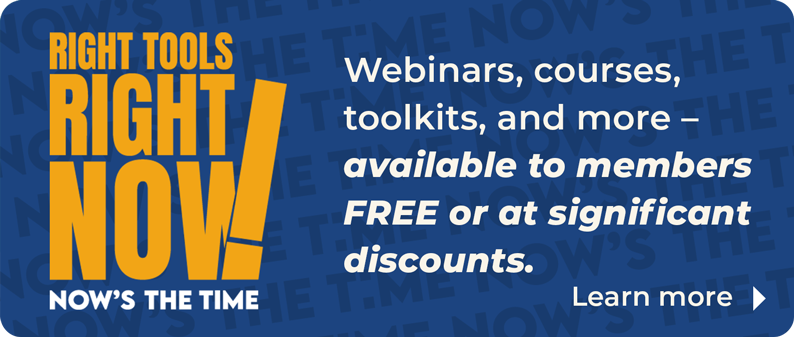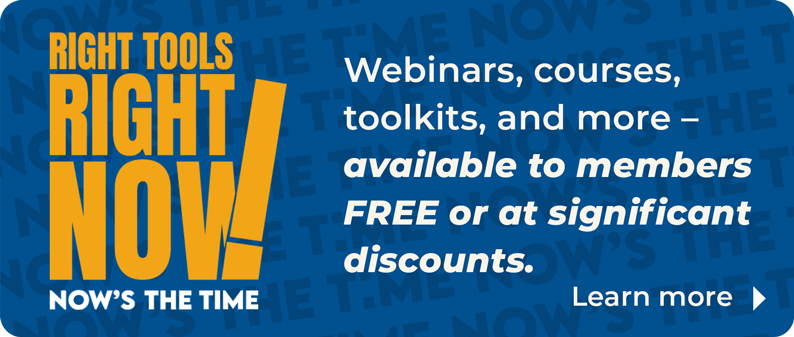Background. The National Association of REALTORS® Association Executives Committee formed a work group whose purpose is to identify a body of knowledge for volunteer leadership and create a curriculum that identifies training and orientation programs which can be offered at all levels of the REALTOR® association. The work group was comprised of both association executives and REALTORS®.
Approach. The approach taken to develop the body of knowledge was to first identify key competency areas for successful volunteer leaders in organized real estate.
Definition of Competency. A competency is defined as “the ability to do something successfully or efficiently”. For the purposes of the work group’s task, a competency is further defined as a set of skills, knowledge, behaviors, attitudes and experiences, which result in a high level of leadership performance and advances the mission and vision of organized real estate.
Identified Competencies. This document identifies four competencies which are critical for successful volunteer leadership at all levels of the ever-evolving REALTOR® association:
- Organizational Knowledge
- Interpersonal Skills & Collaboration
- Delivering Results
- Strategic Visioning
Note: The necessary behaviors, skills, knowledge base and experiences for a successful REALTOR® volunteer leader may vary from association to association, depending on the association’s size, organization structure, staffing, demographics and the diverse needs of the membership. Regardless, the successful volunteer leaders should strive to develop proficiency within each of the identified competencies.
Competencies
Organizational Knowledge
This competency focuses on volunteer leaders’ commitment to continuous learning about the REALTOR® organization. This includes the attainment of a foundational understanding of the REALTOR® organizational structure, culture, and core programs/services, in order to support the mission of each level of the association, and the collective, positive impact on the real estate industry and the public the industry serves.
Competence is demonstrated through: 1) an ongoing understanding of the structure of organized real estate, 2) a commitment to a positive organizational culture, and 3) an adherence to fiduciary duties, corporate and other obligations which are necessary to serve effectively as a REALTOR® volunteer leader.
Successful volunteer leaders should:
- Organizational Structure:
- Demonstrate an ongoing understanding of the fundamental structure of each level of the REALTOR® Association, including knowledge of mission and vision and values; key policies, finances, governance and staff structures, in order to take an active role within the organization.
- Understand that at each level of the association, depending on needs of the membership, the approach to governance, organizational structures, professional staff, programs, and use of resources may vary.
- Actively participate in key association business meetings to learn about current and potential policy and programmatic changes for the association.
- Possess a knowledge of core standards requirements, key programs of the association, including advocacy (political, legislative, PAC and regulatory matters), multiple listing service, professional development, professional standards, communications, business development, member engagement and community engagement.
- Positive Culture:
- Encourage and support a positive culture that aligns the mission, vision, core values, strategic objectives and key programs of each level of the association.
- Contribute to and foster a culture of high ethical standards, integrity, civility, professionalism and trust at all levels of the association.
- Commit to a developing a positive culture and relationships between volunteer leaders and staff.
- Adopt a servant-leader attitude, in order to best serve the members.
- Duties and Obligations:
- Remain knowledgeable on the association’s governing documents and key policies.
- Understand and adhere to fiduciary duties, corporate, legal, and other key obligations in order to protect the association. Understand how to balance confidentiality with transparency. Understand the importance of minimizing conflicts of interest between levels of the association.
- Understand the basics of association finances.
- Demonstrate a working knowledge of parliamentary procedures.
- Possess skills to effectively participate in and lead meetings.
- Understand that the volunteer oversight role in HR matters is limited to the Chief Staff Officer.
- Work in collaboration with staff on the development of governing policies.
Interpersonal Skills & Collaboration
This competency focuses on volunteer leaders’ articulating, building, strengthening and positively influencing relationships with members, key stakeholders, other volunteers, professional staff, and organizations, which allows the association to successfully achieve its mission, organizational goals, value proposition and priorities.
Competence is demonstrated through 1) successful relationship building, 2) effective and persuasive communications, and 3) engaging in meaningful collaboration with other individuals and organizations. Encouraging community engagement.
Successful volunteer leaders should:
- Relationship Building:
- Effectively manage and guide Board of Directors and/or committee efforts, through consensus building and conflict resolution. Provide an appropriate level of feedback concerning progress towards achievements of the Board’s and/or committees goals.
- Understand volunteer and staff roles and contribute to a positive partnership with the AE and other staff.
- Obtain member input on and be responsive to members’ needs.
- Build strong and positive relationships with other leaders, membership and internal and external key stakeholders.
- Build strong and positive relationships with organizations within the community.
- Identify, guide, and mentor future leaders for the association and encourage other leaders to also do so.
- Provide leadership training for future leaders of the association.
- Communications:
- Build an in-depth knowledge base on critical issues of importance to the association.
- Positively impact and influence other association leaders, members and internal key stakeholders.
- Positively impact and influence external audiences in support of the association, the industry and private property rights.
- Develop strong spokesperson skills in order to positively represent the association before the media, on social media, and in civic and community activities.
- Create a team of trained, knowledgeable association spokespersons and be willing to delegate authority to the best trained spokesperson on specific topics.
- Collaboration:
- Leverage association resources effectively through informal and formal collaboration.
- Identify and seek collaborative relationships with other real estate associations and other key stakeholders, to achieve common goals and further the mission of the association.
- Identify and seek formal coalitions with other organizations to achieve common goals and further the mission of the association.
- Articulate and champion a culture of community engagement that is reflective of the desire to build strong communities.
- Participate actively, and lead members to participate actively, in programs which improve the communities in which they live and work.
Delivering Results
This competency focuses on volunteer leaders’ ability to act as responsible and accountable stewards of association resources and take appropriate actions which meet the needs of members in an ever-changing environment.
Competence is demonstrated through 1) acting as responsible stewards of association resources, 2) developing the skills necessary to make sound decisions on behalf of the association, and 3) the ability to lead the association through change.
Successful volunteer leaders should:
- Accountability:
- Accept responsibility in meeting expectations and the requirements of leadership roles. Hold other volunteer leaders accountable to the same standard.
- Act as responsible stewards of association resources and align these resources to meet the needs of membership through prioritized programs, development of strategic and operational plans, and financial management oversight.
- Regularly seek input from, and be responsive to, the members and other key stakeholders to ensure that the use of resources provides valued services and programs.
- Ensure the association is compliant with NAR Core Standards requirements.
- Decision making:
- Possess the business acumen and skills necessary to effectively carry out decision-making roles.
- Seek appropriate input from members and other key stakeholder prior to making critical decisions on behalf of the association.
- Be prepared and present, in order to participate actively in formal leadership decision-making settings.
- Identify opportunities, and analyze problems, and evaluate alternative solutions in order to make timely recommendations in the best interest of the association.
- Understand the fiduciary, corporate and legal duties inherent in making critical decisions on behalf of the association and its’ members.
- Seek out legal counsel and/or subject matter experts to provide valuable insights, to assist in decision-making on critical issues.
- Develop effective and viable solutions which are aligned with the mission, vision and strategic goals and initiatives of the association. o Monitor progress on the execution of approved decisions.
- Leading through change:
- Be knowledgeable and articulate on historical knowledge, current conditions, and future trends which could have an impact on real property owners, the real estate industry and the association.
- Anticipate and influence industry, economic, legislative, regulatory and community changes which impact the above.
- Create and influence collaboratively to policy formulation and the direction of the REALTOR® organization.
- Communicate proactively with members, staff, internal and external key stakeholders on anticipated changes which may impact the association.
- Embrace an adaptable and flexible mindset.
Strategic Visioning
This competency focuses on enhancing volunteer leaders’ abilities to be future thinking, committed and creative in developing and implementing a long-term collective vision for the association.
Competence is demonstrated through: 1) an understanding of, and commitment to, setting the long-term strategic vision for the association, and 2) adopting a mindset that embraces innovation.
Successful volunteer leaders should:
- Strategic visioning:
- Understand the importance of focusing on the association’s long-term vision, goals, culture and strategic initiatives, rather than tactical matters, which are primarily developed by the professional staff, depending upon association capacity.
- Regularly engage in leadership, industry, association and other specialized training to strengthen key competencies, broaden strategic visioning and planning skills.
- Engage in, and be responsible for engaging other volunteer leaders, in visioning and planning exercises.
- Identify, engage and grow future leaders for the association through involvement in the strategic visioning process.
- Develop initiatives, goals and priorities that support the association’s mission, long-term vision and plans and eliminate those programs which no longer meet critical needs.
- Innovation:
- Address future needs of the association and the industry through creative problem solving, informed risk taking, and fostering new ideas.
- Study trends in order to contribute to the creative process and appropriately tackle new challenges on behalf of the association and the members.
- Ensure due diligence and a thorough financial assessment and risk analysis takes place prior to taking on any major new strategic initiative.
- Be well informed about, and willing to take on appropriate risks in order to grow the association and industry in new directions. Accept the possibility of failure – fail fast and learn from it.












